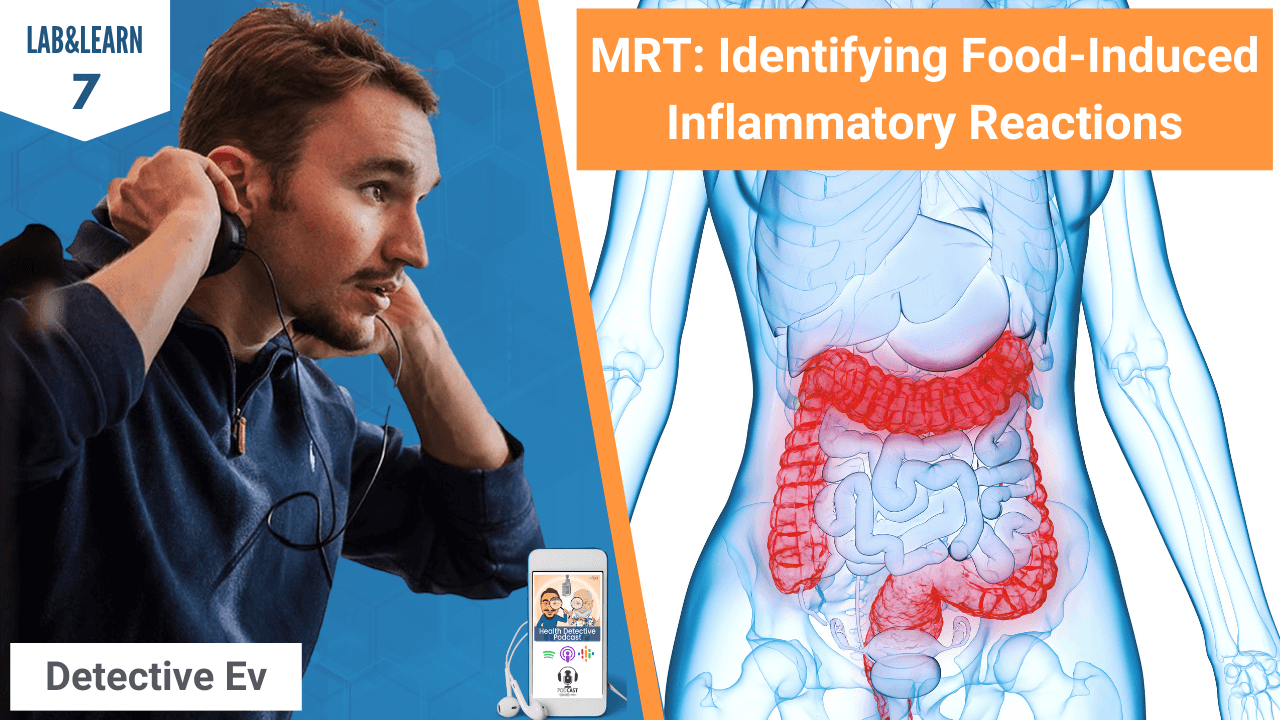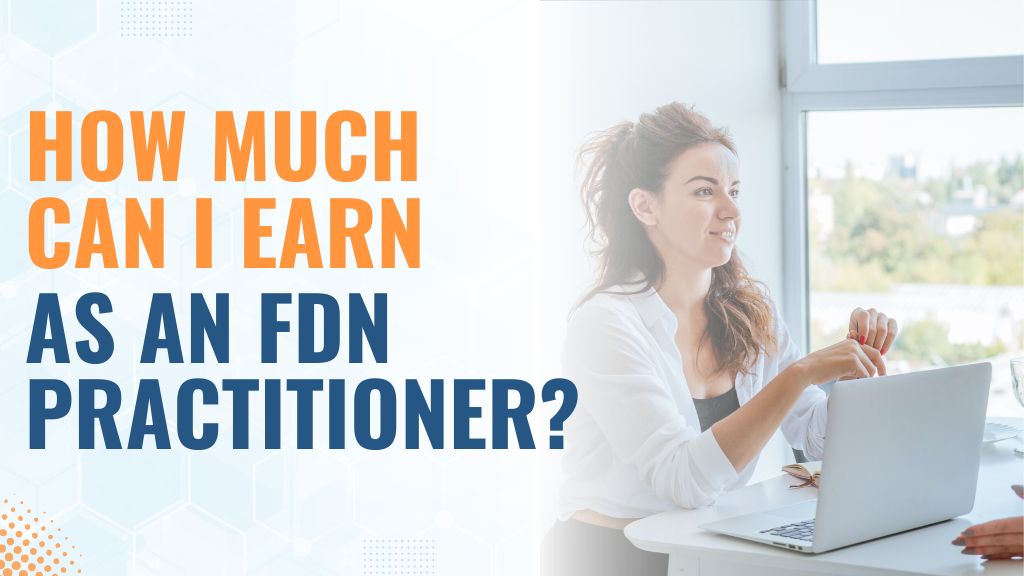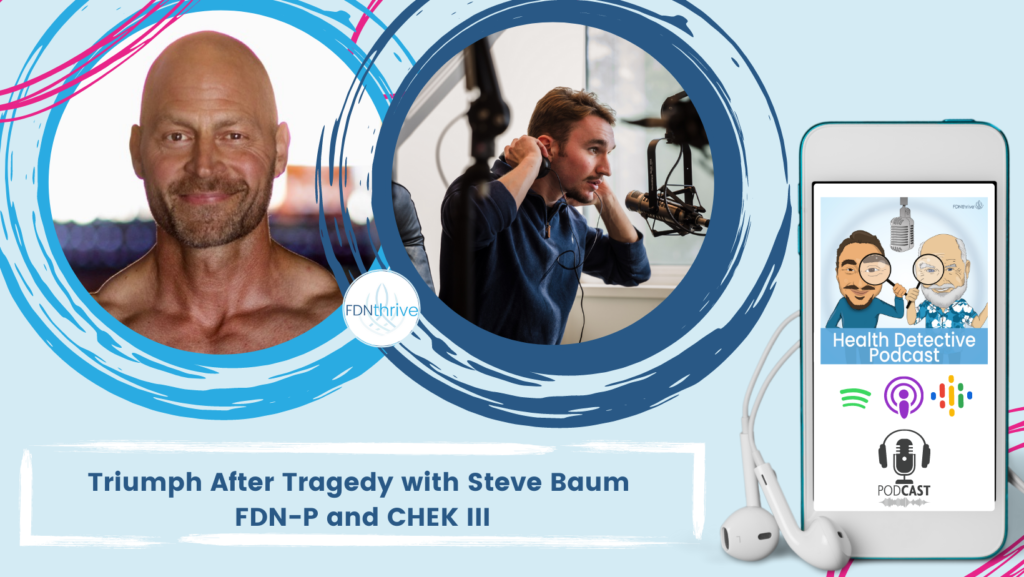
Introduction
Summary About Steve
After a comment about Steve’s weight from a guy he idolized, Steve could think of nothing else but transforming himself and getting lean and muscular from that moment on by lifting weights and learning to take care of himself the correct way. Later in life, this passion led to his career.
Steve went on to earn many strength and conditioning certifications. He opened his dream training facility, including an incredible gym and a state-of-the-art physical therapy clinic. He had a dream home, a big horse farm, a hundred acres of just like Disneyland. He had a great life, great marriage, and an awesome little boy who was six years old.
Then in the blink of an eye, everything changed. His little boy fell through ice in a lake and drowned. After this horrific trauma, Steve lost his business, his marriage, and farm. He lost a lot of stuff. The stress from all this had a devastating impact on his health. After meeting and working with the founder of FDN, Reed Davis, weak links in Steve’s metabolism were identified and corrected, helping him to get back into the best shape of his life.
This transformation led to Steve pursuing and completing his FDN certification. He realized he could use FDN to help other exhausted business owners and entrepreneurs regain their health problems. He also felt called to help those submerged in traumatic “hells” to get out and live their best lives. In the long run, Steve says his life experiences have given him a new life.
Evan: All right. Hey there, Steve. Thanks so much for being here with us today, man.
[00:08:00] Steve Baum: Sure, Evan. I’m looking forward to it.
[00:08:02] Evan: I thought it was so cool when we were talking the other day. Steve and I just got connected and he is an FDN as I mentioned in the bio, but Steve is also one of the OGs of this place, man. I mean, he’s been, I think you said what 2009 is when you graduated Functional Diagnostic Nutrition. Was it even a thing yet, or was that a weekend course?
[00:08:20] Steve Baum: No, I think it was the first online program that Reed did.
[00:08:24] Evan: Awesome! I’ve met some people that have gone pretty far back in this. Sean Croxton namely. Yeah, to hear 2009, it’s just cool to know people were doing this at this time. Even though I didn’t experience it in that moment, just to know how far it’s come, that’s amazing. But we’ll roll into this just the same way that we do with pretty much everyone on this podcast.
That’s just kind of diving into your health story. I mean, what motivated you to take this path in life? Did you have your own health issues or specific things that bothered you? Because what I found, especially after all these interviews, is that really no one gets into this work by accident. It’s pretty intentional.
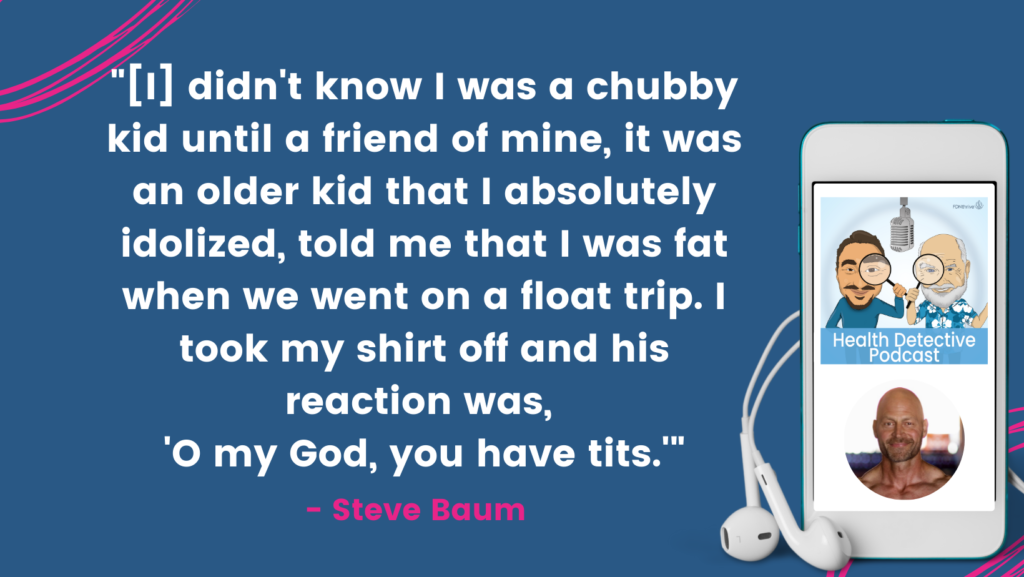
[00:09:04] Steve Baum: Yeah, you know, as a kid growing up, I was always a chubby kid and didn’t know I was a chubby kid until a friend of mine, it was an older kid that I absolutely idolized, told me that I was fat when we went on a float trip. I took my shirt off and his reaction was, “O my God, you have tits.” At that age, I think I was 12ish, it just freaked me out. From that moment on my mission was to figure out how to get myself to look like he looked, which was really lean and ripped.

That’s kind of what started me on the nutrition and workout journey at that age. Of course, I had no idea what I was doing. It was just kind of like hodgepodge stuff together and follow the magazine articles and all that kind of stuff. So that’s really what got me started, was trying to get myself to look like the guys in the magazines.
[00:10:04] Evan: It’s so tough because I work a lot in schools and the audience knows that. One of the things I’d love to move away from is the whole bullying thing. I mean, that’s great.
That’s not the main thing I talk about, but I also can’t deny, I don’t know how to quantify this or allow a certain perfect dose of this into our lives, but it’s kind of hard to say, knowing that where you’re at now and the things that you’ve accomplished, that maybe a comment like that, wasn’t actually something that was overall, long-term very beneficial to your health.
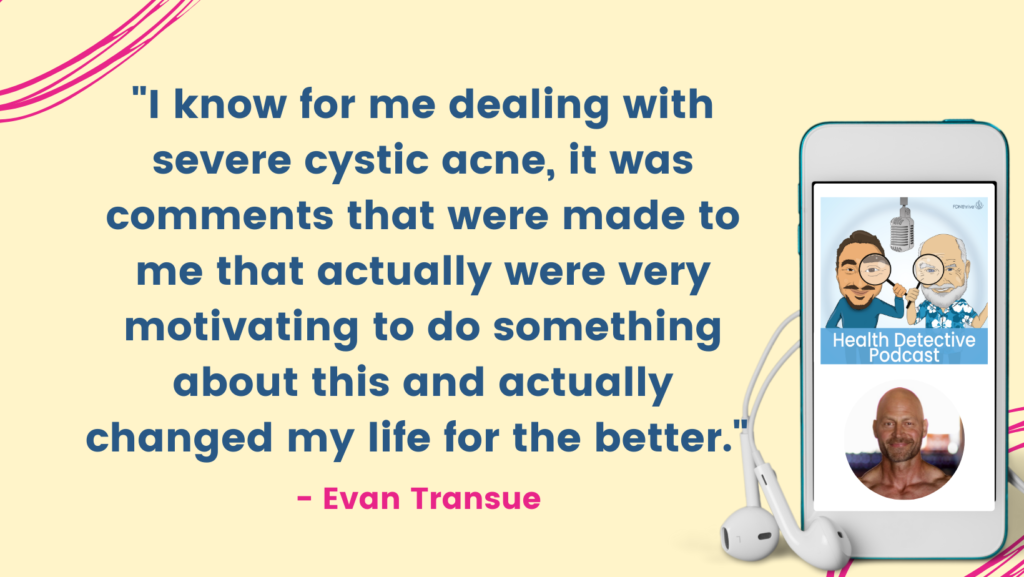
And I’ll have you respond to that in a second because I don’t want to speak for you. But I know for me dealing with severe cystic acne, it was comments that were made to me that actually were very motivating to do something about this and actually changed my life for the better. I’m not saying it didn’t hurt in the moment and cause stress in the moment, but I don’t know that I would change those things.
So again, I don’t want to speak for you, but where do you kind of stand with that? Do you look back and think, wow, I’m really fortunate he made that comment because I wasn’t thinking about it or “Hey, there would have been a 10 times nicer way to do this.”

[00:11:06] Steve Baum: Yeah, if he hadn’t said that, I’m not sure what I would be doing now if anything would have changed. But to talk about the bullying part of it, he didn’t say it in a bullying way. It wasn’t like he constantly picked on me or anything like that. It was actually his initial reaction to seeing me take off my shirt. That’s what came out of his mouth. For me, I’m glad that he did say it because it did motivate me and it still to this day motivates me to stay active, to keep trying to make myself better. Then in turn, use the information that I’ve learned to help other people make themselves better. I don’t think that bullying helps anybody, but in his case, it wasn’t said in a way that was meant to bully me.
[00:12:00] Evan: Now I understand that. Actually, if anything, that kind of comment could be even more motivating when it’s so genuine.
You’re just like, wow, what the heck man. You know that it really wasn’t meant with mal-intent. I definitely understand that as well. You’re motivated to do this now and I know as we read in your bio, you’re someone who kind of got into this, right away. But just to break it down and hear it from you yourself, what were some of the next steps?
Was it like the personal trainer? Were you studying stuff online? You were a relatively young guy when this happened. What came immediately after that?
Weight Lifting Starts
[00:12:34] Steve Baum: Yeah, at 12, after that happened, I told my parents, I want you to buy me a weight set. They bought me a Sears weight set that had the plastic weights filled with concrete. They gave me that and a bench.
I went down in the basement and I remember working out with this weight set and I had pictures of bodybuilders all over my walls from the magazines. I would just follow their routines. Of course, I had no idea what I was doing. I didn’t know how to eat. I remember doing a bunch of sit-ups and then I’d go upstairs and eat bologna and cheese sandwiches. That wasn’t working out too well for me.
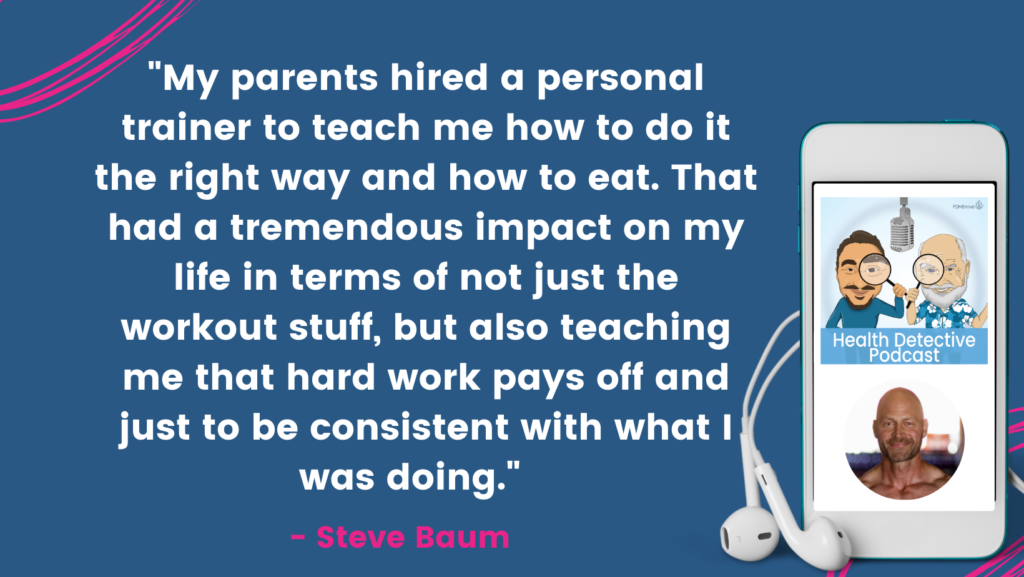
Fortunately for me, my parents hired a personal trainer to teach me how to do it the right way and how to eat. That had a tremendous impact on my life in terms of not just the workout stuff, but also teaching me that hard work pays off and just to be consistent with what I was doing. Because it wasn’t an overnight thing. I didn’t go from being a chubby kid to being fit overnight. It took determination and just sticking with a plan.
[00:13:46] Evan: That was the part of your bio I found most interesting, that by 16 you’re taking clients now. Yes, four years is a fair amount of time to make a transformation, but guys, we’re talking about 12 to 16. I don’t need to be reminded of what I was doing at 12 to 16. I don’t think I was going in a positive direction per se, but at least in my own life. That’s pretty damn cool that you were able to get locked in like that and then say, hey, I’m actually gonna go do this and help other people with it. I’m going to start taking clients. Did you do that at a home gym or were you already doing that locally at a gym?

[00:14:18] Steve Baum: Well, the guy that I learned from, he had his own gym and he had such a positive impact on me that we became friends. I know it sounds kind of weird. I’m 12, 13, 14 years old, he was probably more like an older brother figure to me. We became friends and I just devoured all of the information he gave me. It wasn’t just, we would meet in the gym and that was the end of it. He would give me stuff to go read. He would tell me different things about nutrition to study.
I really soaked it up and knew that that’s what I wanted to do. So, he hired me to work for him in his clinic. He started giving me clients when I was 16. They were pretty much beginner clients. They weren’t anything complicated. He would write the programs and I would go train them.
[00:15:11] Evan: Well, and fair enough. I think that makes sense. This is still such a cool opportunity to be able to do that at all at that age. But then this is where it gets really interesting to me because there are, and there’s nothing wrong with this, I’m not condemning it, but I am someone who believes in lifelong learning.
I think that’s a very common theme in our world of FDN and even functional health care in general. I find it interesting; I mean your list of credentials and certifications and all these things that you’ve done is rather extensive. I’m sure if you’re already taking clients at 16, you’re at a pretty solid place.
What motivated you to keep learning and consuming this information and going even deeper with it?
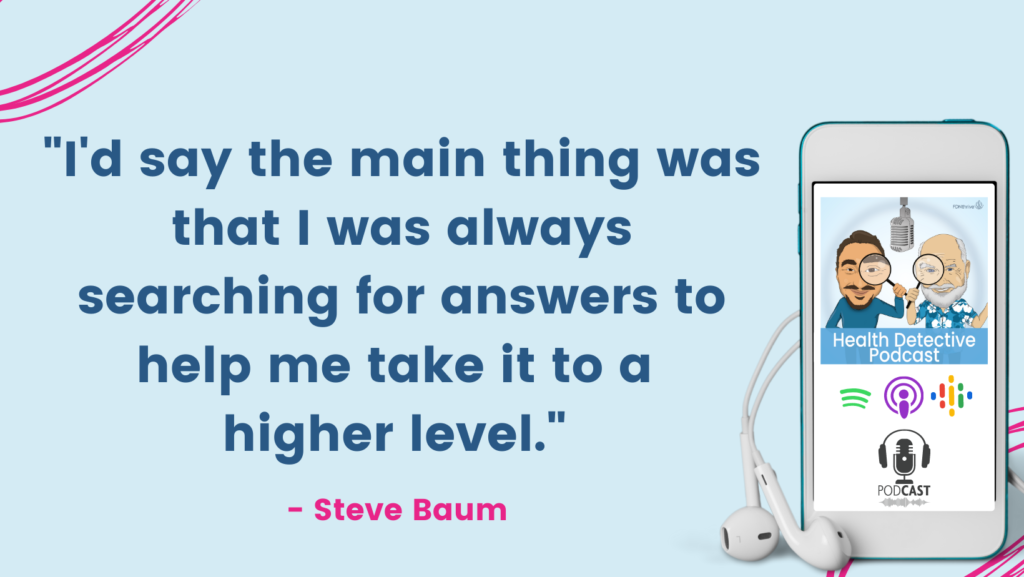
[00:15:52] Steve Baum: I’d say the main thing was that I was always searching for answers to help me take it to a higher level. I thought, gosh, there must be something that I’m missing in regards to creating more strength or creating more muscle mass or recovering better or whatever it might be.
I love to learn and I love to find things that nobody else knows or nobody else is doing. It’s not mainstream. What I tended to do was I started off with Personal Trainer Certifications and went through some of those. They didn’t really give me the information that I was looking for.
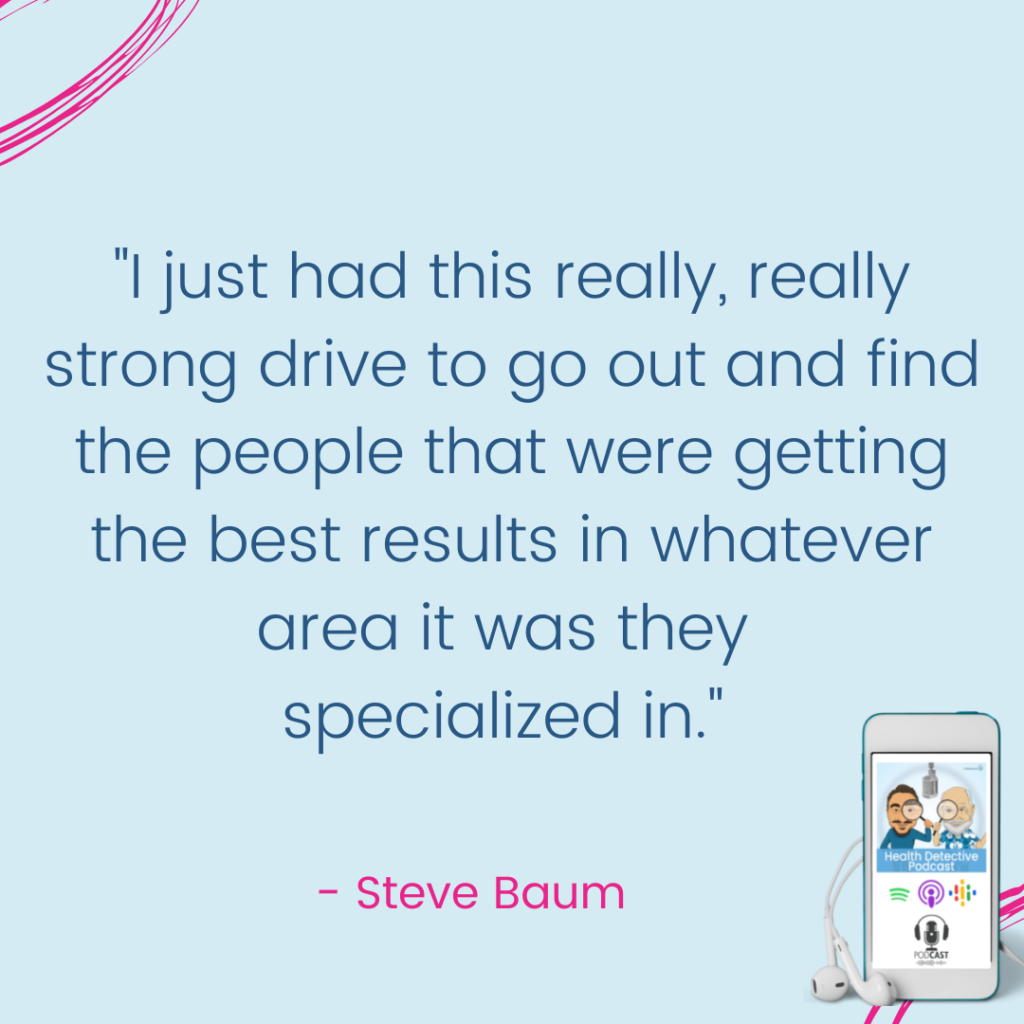
It was great. It was a piece of paper that said, hey, I’m certified, but it didn’t really teach me how to help myself or to help other people overcome some of the obstacles that we were running into. I just had this really, really strong drive to go out and find the people that were getting the best results in whatever area it was they specialized in. Whether it was injuries or, getting people lean, or getting people stronger. I would go to them and I’d say, will you teach me what you know?
It was kinda more like an internship type program where I would go find these people and get into their programs and take what I liked and take what worked and use that in my program and then get rid of the rest. Because what I found is everybody has really good information and not all of their information might be applicable to everybody. I would just take what I like and piece it together and I put it into my own program, if you will. I’ve always done that. I just keep trying to find answers that might be obscure, that most people aren’t looking for.
[00:17:48] Evan: I like that philosophy a lot. I feel like that’s really similar to what I do, because even when I read a book, it might be 300 pages in it, but if I can just get two or three really good ideas and apply that to a grander picture that I’m creating, that’s now my own philosophy.
I always find that very effective. That’s kind of how I’ve unintentionally approached it over the last, I don’t know, seven, eight years since really intentionally learning anything. Because prior to that, it was just forced learning in school. This period of my life has actually been, hey, I want to voluntarily do this.
I know that we could probably spend hours talking about each individual qualification and certification that you have, but of course, I got to hone in on Functional Diagnostic Nutrition specifically. One, how did you find that? When you were going through, I guess it’s 2009, so I don’t even know, were there lab tests included in the program at the time? Were you running labs on yourself?
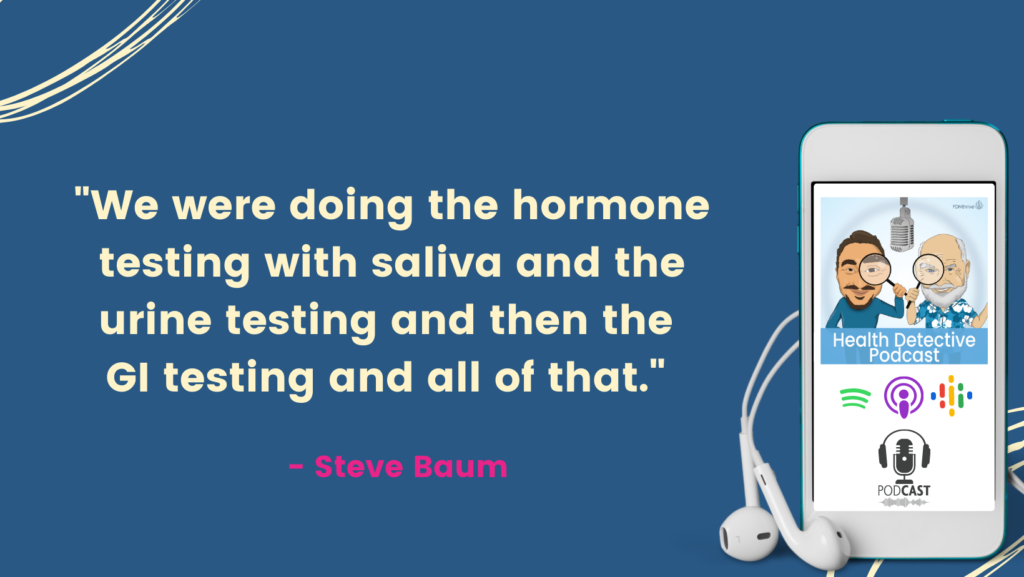
[00:18:40] Steve Baum: Yeah, back then, if I remember right, it was BioHealth was the company that we were using to run labs with. They were very similar to the labs now. We were doing the hormone testing with saliva and the urine testing and then the GI testing and all of that.
Yeah, we were doing labs back then. I got turned on to the FDN, so I was in the CHEK Program with Paul Chek and I was going through different levels of that. If I remember correctly, they were doing metabolic typing in one of the programs I was in. I became a metabolic typing advisor, way back before I even known about FDN.
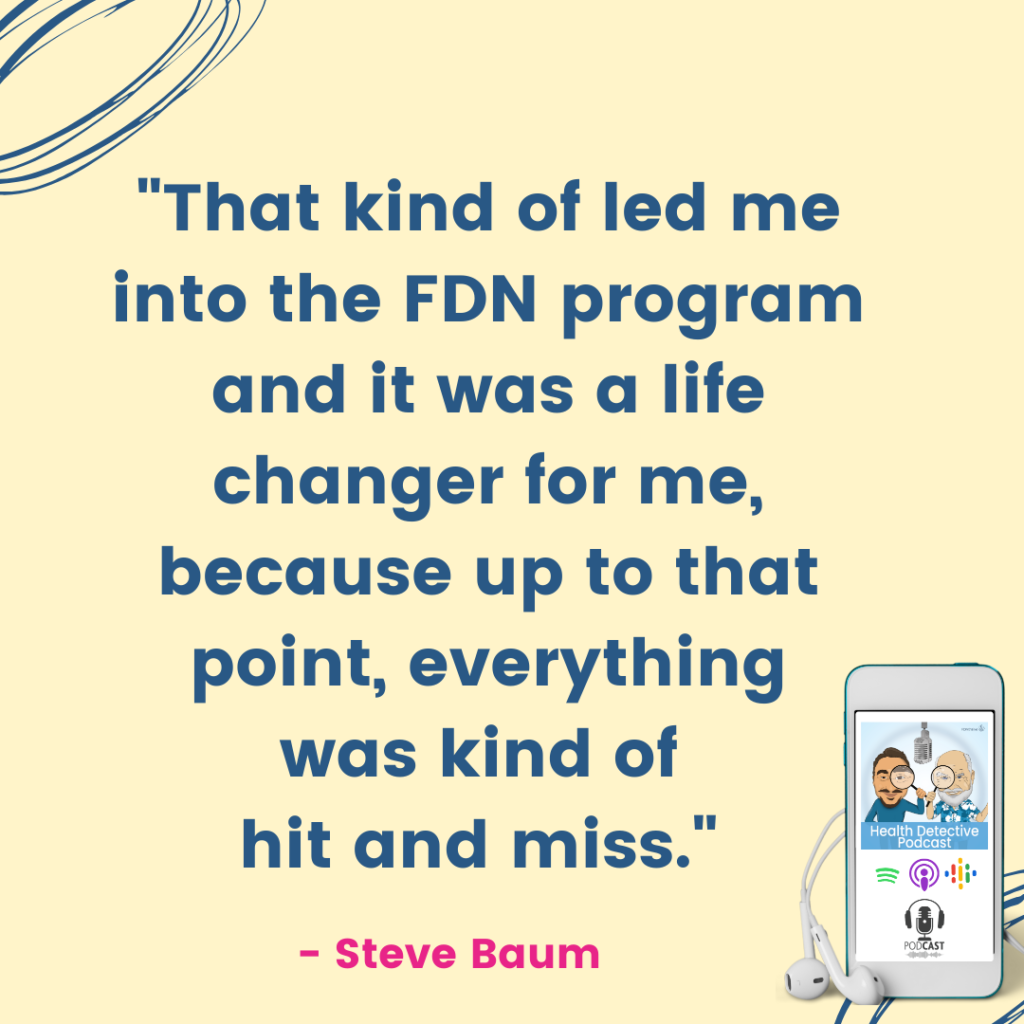
That kind of led me into the FDN program and it was a life changer for me, because up to that point, everything was kind of hit and miss. It was like, oh, well follow this diet or try this nutrition program, or, do this, do that. Sometimes it worked and sometimes it didn’t.
What I found with my clients was some of them would get really good results on a program and other ones wouldn’t. I knew there had to be more to it than just throwing darts at the dartboard and hoping they stick. That’s where the Functional Diagnostic Nutrition came in.
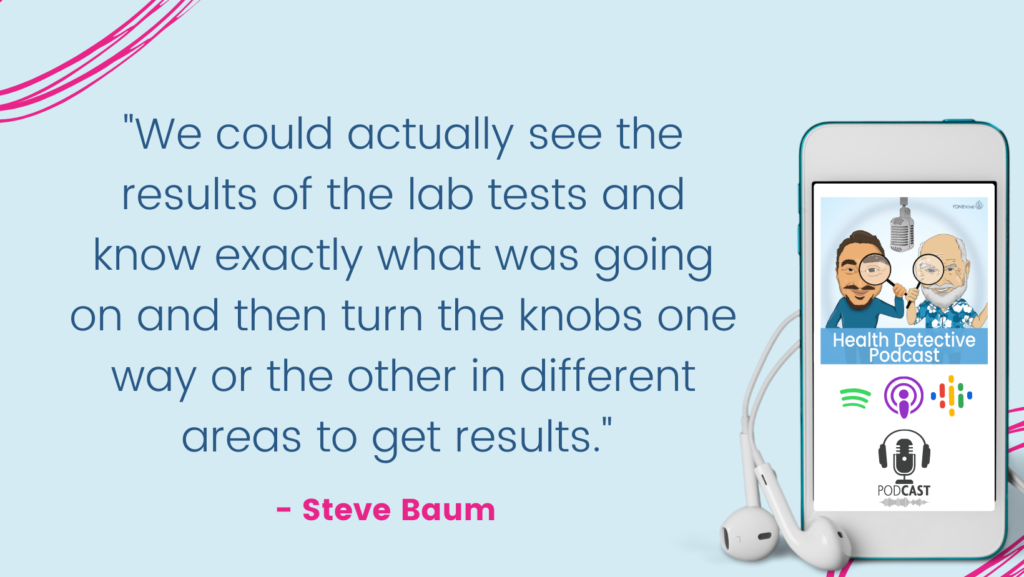
We could actually see the results of the lab tests and know exactly what was going on and then turn the knobs one way or the other in different areas to get results. That was an eye-opener for me. That really kind of set the stage for where I wanted to go with, not just my business, but also with my personal health.
[00:20:28] Evan: I’d be pretty impressed if you’re remembering like specific numbers, so I’m not asking that. But I am curious when you were doing the labs on yourself, were there any major things that you remember to this day as being like cool turning points? Because for those that don’t know, or maybe even our first-time listeners, one of the things with FDN is we attract a lot of people who are actually quite ill, such as myself, when I first got into it.
However, you also attract people who are doing pretty well. They’re very health conscious. When I say doing well, it means like doing well on the surface, because I’m going to take a wild guess that when you were getting into FDN, you might’ve looked like someone who was fit or decently in shape or whatever at this point, considering your background. Then maybe you found something on the labs. You’re like, wow, I’ve never even considered that. Was that the case? Did anything come up that really stood out?
[00:21:17] Steve Baum: Yeah, getting into the gym at 12 years old and being around all of the bodybuilders and the athletes in the gyms. The gyms that I worked out at tended to be a lot of the big meathead guys that were huge, then a lot of the professional football players and all that.
Damage of Stimulants
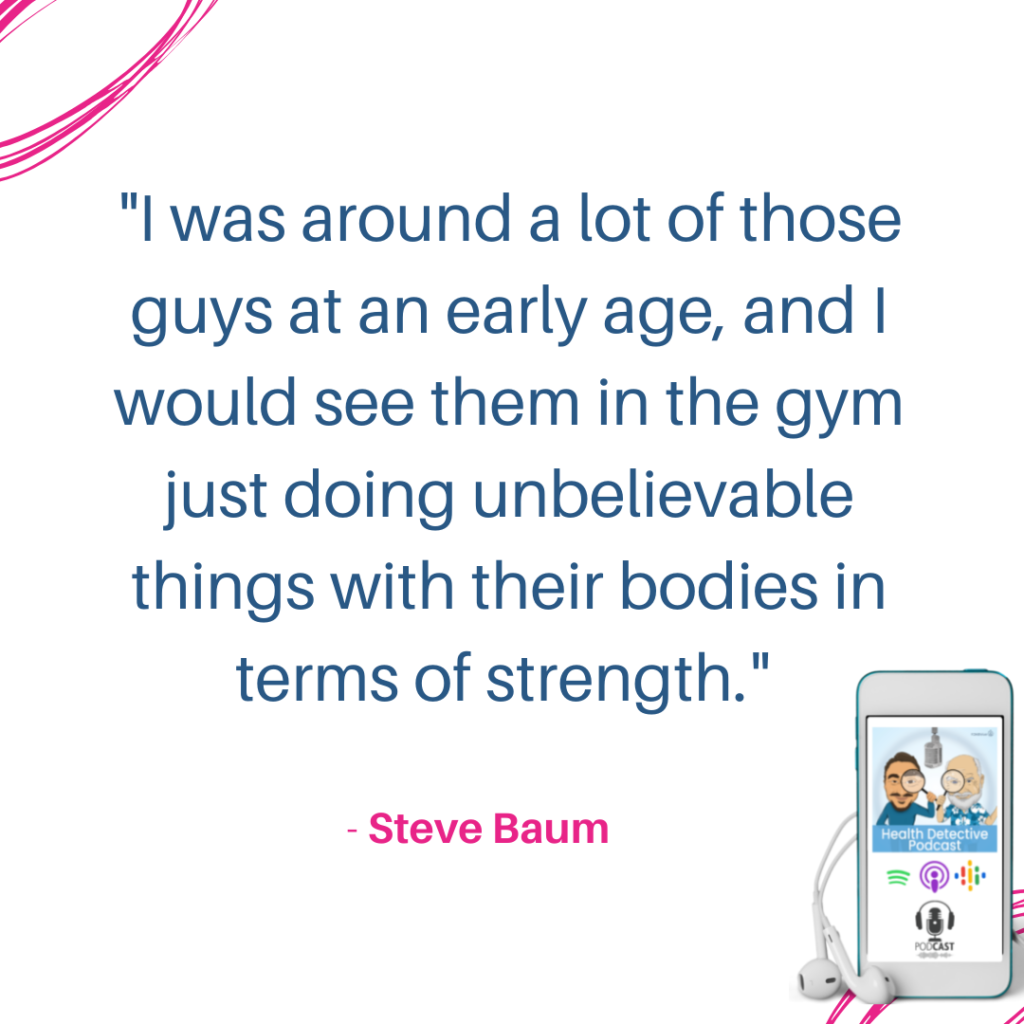
I was around a lot of those guys at an early age, and I would see them in the gym just doing unbelievable things with their bodies in terms of strength. One of the things I got turned into early on was pre-workout supplements or they were really stimulants. I used a lot of energy supplements and drinks, a tremendous amount of them. We all did back then and didn’t realize the impact it was having on my health until I did run those labs.
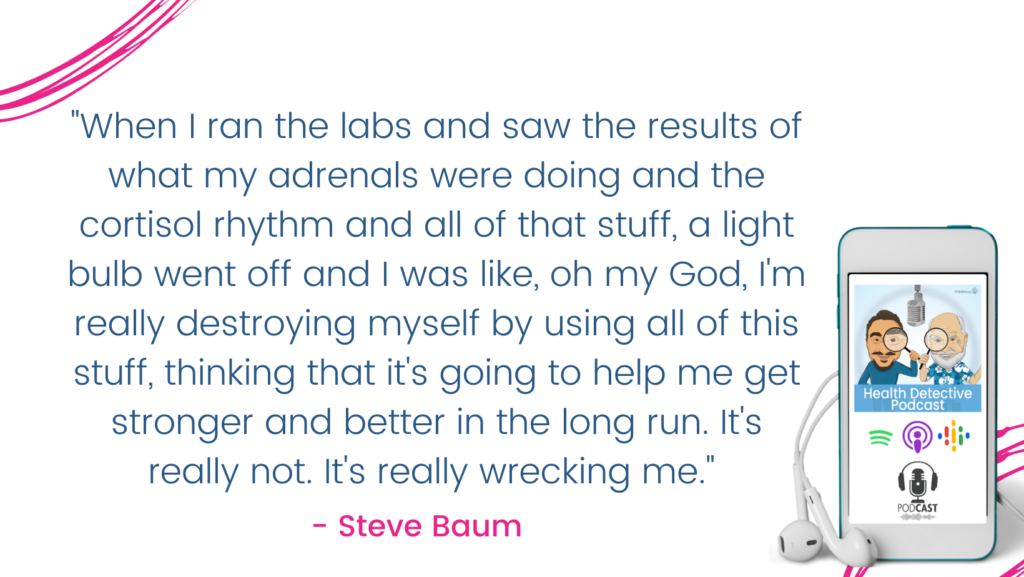
When I ran the labs and saw the results of what my adrenals were doing and the cortisol rhythm and all of that stuff, a light bulb went off and I was like, oh my God, I’m really destroying myself by using all of this stuff, thinking that it’s going to help me get stronger and better in the long run. It’s really not. It’s really wrecking me. It’s actually going to cause me to lose muscle and lose the ability to recover and get to where I want to go. That was an eye-opener for me.
My first test back then, we were talking in stages of adrenal fatigue; we don’t do that anymore. But back then, that was the thing was what stage of adrenal fatigue are you in? I was late-stage three. The next stage was I was going to die if I didn’t stop doing what I was doing. That was an eye-opener for me in terms of what I was doing to myself in the name of health.
[00:23:04] Evan: Gotcha. I’m just trying to put your story together cause you’ve done a lot in your life. I’m guessing, what, were you only in your twenties at this point?
[00:23:14] Steve Baum: Let’s see. Geez.
[00:23:18] Evan: You’re certainly younger than 35 is my point.
[00:23:21] Steve Baum: You mean when I was using all of that stuff?
Evan: Yeah.

Steve: Oh, I started taking the energy pills and drinks at 13 or 14 years old.
[00:23:33] Evan: Yeah, see, when I was a kid, I got into weightlifting and stuff, I always had the conversations with my parents first. It’s like, all right, whey protein. I got to convince them of that. This was classic, like GNC stuff. Then it’s the Creatine. Then the pre-workout and that’s kind of where they drew the line.
I’ll never forget, I can definitely say this because it’s factual, the Jack3d thing, do you remember that pre-workout that got taken off the market because of the one ingredient that it had? I finally convinced my parents, let me do this stuff. I take it and a month later, this is on the news getting taken off and they’re just like, nope. Done.
[00:24:12] Steve Baum: Yeah, it’s only because we were all taking Ephedrine and there was a pure form of Ephedrine that you could buy at a gas station and it was called Mini Thins. A lot of people were taking that in the gyms. Then there was another company that came out. I don’t remember the name, it might’ve been Hydroxycut or something like that. They put that in their supplement for weight loss and people were losing a ton of weight.
Looking back on that, it was in all of the drinks that were out. You could buy it. It was everywhere and nobody really thought much of it. You’d take it. You’d have energy. You could work out all day long. That was that, but it truly wrecked my health. It makes me think about the kids today that are out there drinking Red Bull and Monster drinks.
It’s in all of the extreme sports, like the mountain biking. The kids doing all of this stuff on their mountain bikes, the tricks and the flips and all that. It’s just big in motocross. It’s big into that world and the parents don’t even realize what they’re allowing their kids to do.
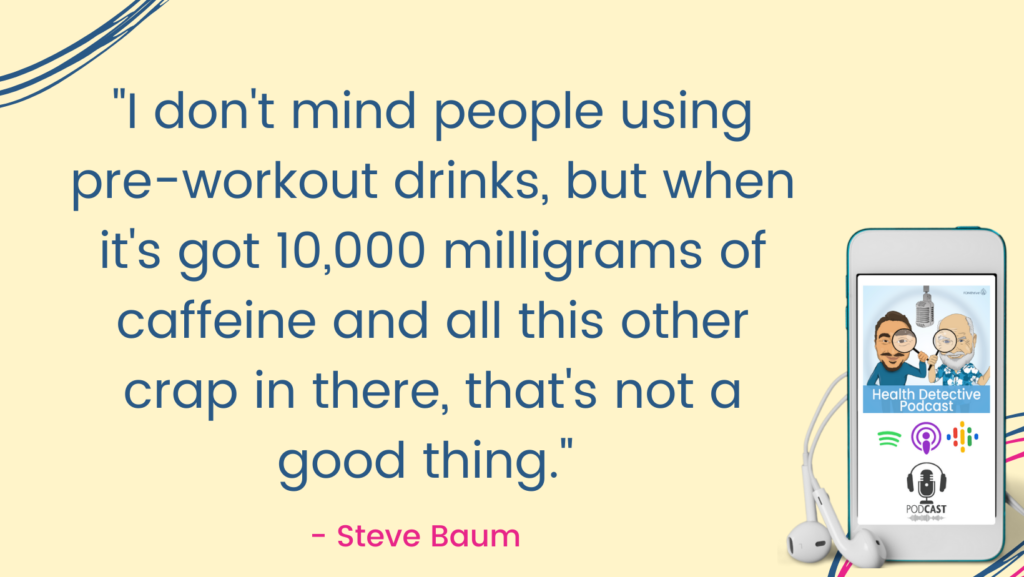
It’s just kind of part of the whole sport and everybody drinks it and its wrecking people. That’s the one thing that I am really against is using, I don’t mind people using pre-workout drinks, but when it’s got 10,000 milligrams of caffeine and all this other crap in there, that’s not a good thing. That was an eye-opener for me, for sure.
Is More Better?
[00:25:45] Evan: Now this is coming from a person who certainly has not taken this to the level that someone like you have. Maybe there is a give and take with this or a trade-off at certain points, but I always find just so unbelievably toxic, as someone who knows about the chronic health conditions of today’s world, is when I’m seeing these people on Instagram or whatever, they’re quote, unquote influencers. They’re talking about how exhausted they feel or how burnt out they feel and they’re using this supplement to go get through the workout. I’m like, all right, I’m no doctor, but I’m going to imagine that that probably meant you shouldn’t have been doing a two-hour workout that day.

We’re suppressing the body’s warning signs. My God, as if we were not in tune enough already. Now we’re just, oh, we are tired. We know this. No problem. I’ll just take something that prevents me from feeling that tiredness and then go push even harder. I think it’s really obvious, honestly, why FDN, especially in the earlier days, has an abundance, I’ve realized, of people very similar to you that were in this either bodybuilding or strength training or weightlifting type of category, I guess. Then, yeah. It’s not going so well. They look fantastic. A lot of them look great, but the body inside is not going so well.
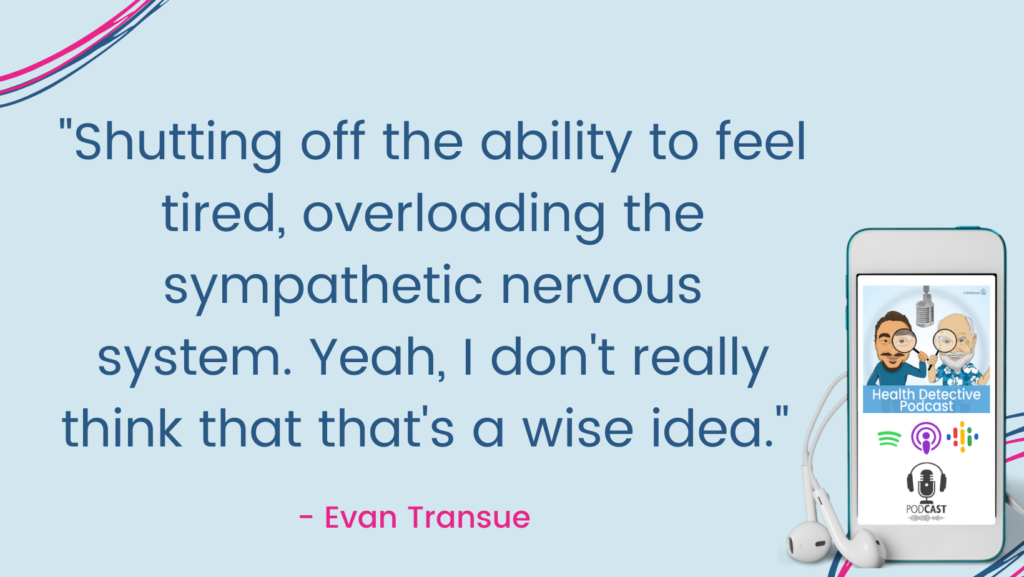
It’s like, well guys, we probably shouldn’t have been doing that ever, let alone in today’s world where we’re really not doing great and we need to get back to nature as much as possible. Shutting off the ability to feel tired, overloading the sympathetic nervous system. Yeah, I don’t really think that that’s a wise idea.
I mean, I got to ask. I know it’s not really normal on the Health Detective Podcast to be talking about this specific thing, but I’m curious. What do you say to these people that are on Instagram as the influencers? And they’re like, oh my God, I was so exhausted today. Got three hours of sleep but I still pushed it in the gym and I took my pre-workout. I would assume you got to believe that’s kind of silly.

[00:27:45] Steve Baum: Yeah, it is silly. But the thing you have to remember is in our society, we’re taught more’s better. Don’t be weak. Push. Push. Push. Push. Push. Do whatever you have to do. Be a warrior. Never give up. All of this stuff bombards us from every direction.
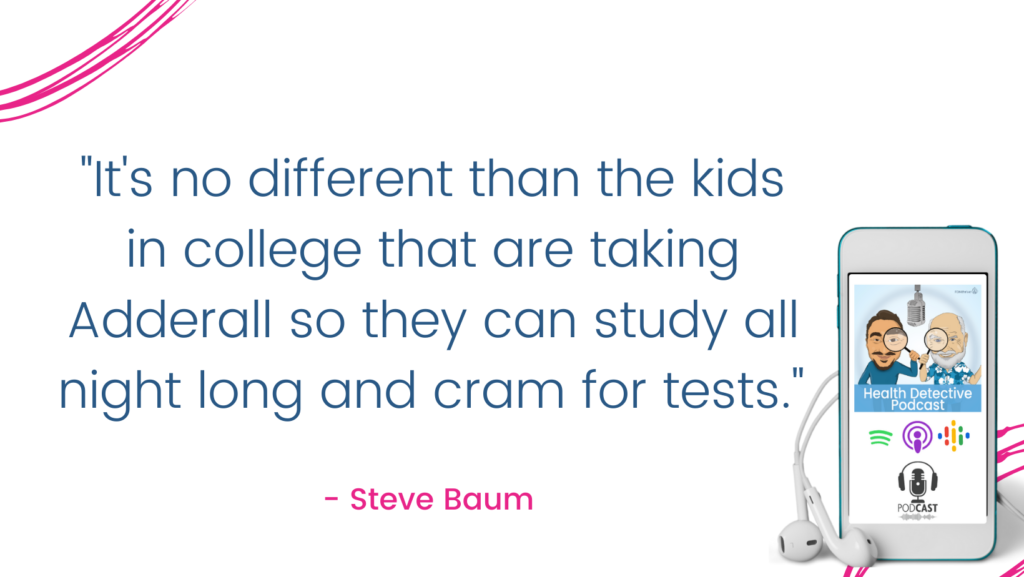
Nobody wants to be a quitter and nobody wants to look weak. I don’t even think they realize that they’re destroying themselves. I think it’s just part of the industry, is to do whatever you have to do to continue moving forward. It’s no different than the kids in college that are taking Adderall so they can study all night long and cram for tests.
They don’t think about what it’s doing to their health. It’s just, I have to get through this. I have to be the best I can be. If I quit, for whatever reason, then society thinks I’m weak. To me, that’s the bigger issue is how do we educate people to work harder and smarter, but not destroy themselves?

You could get a lot more done if you work really hard for 50 minutes and take a break. Then go back to it and then take a break and maybe work four hours a day. You’re going to get more done in a four-hour window working like that than you will if you cram yourself full of all these stimulants and work 10 hours straight with never taking a break.
[00:29:15] Evan: It’s actually remarkable how true that is because first of all, I think that’s very well said.
I’m someone who fell into that category, especially after high school. A lot of that was for validation because I had really messed up a lot of things in my life. I felt like I had no image. I had no self-respect anymore. I had no confidence. One of the ways that I was immediately able to raise that confidence is I’m now a hardworking person.
And what’s interesting is you don’t need any great results in your life to automatically identify as a hardworking person. You can change that tomorrow. I like to work hard now still, but some people are always surprised about how I’m able to do this. It’s only because I found myself after about three to four years of doing that, completely burning out, just totally dipping.
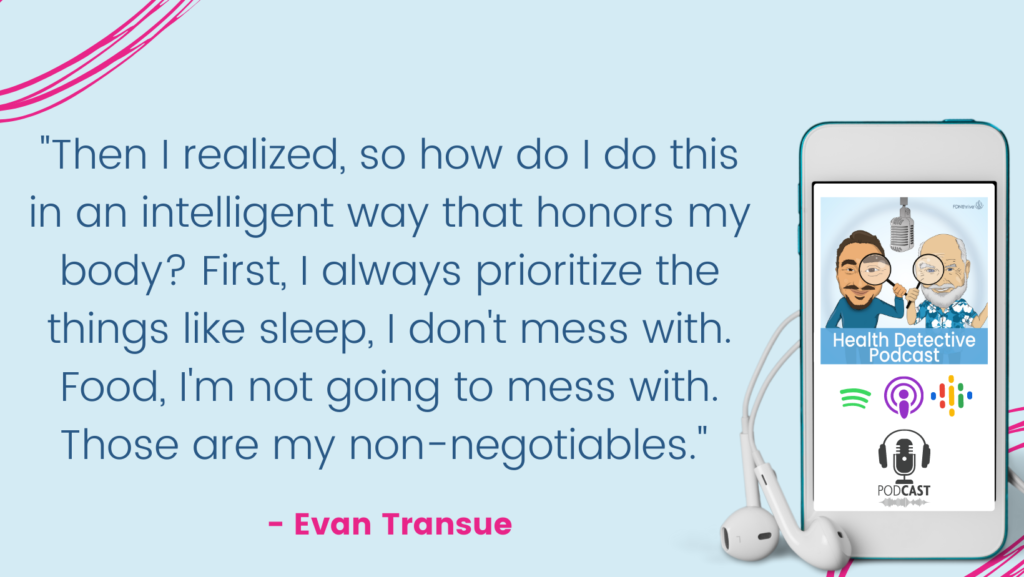
Then I realized, so how do I do this in an intelligent way that honors my body? First, I always prioritize the things like sleep, I don’t mess with. Food, I’m not going to mess with. Those are my non-negotiables. Those have to be in check. That’s how I am. I feel like a lot of us, and you relate to this too, we become very intuitive and in tune with our bodies. I know when I need a little extra rest. I can tell you days before I’m about to catch a cold or something. I feel like I can often prevent those things from happening, if I’m able to listen to my body at that time. When I say “able,” I just mean maybe I didn’t already pack my schedule too much in.

We need to identify, are we working hard because we actually love what we’re doing and we have a specific goal we’re trying to hit, or are we working hard for the million other reasons that we could? Validation. Because society is telling us to, like you said. Then at the end of the day, working hard, quote, unquote, I don’t think that means pushing past our limits.
What is “working hard”?
Working hard to me is when you have a hundred percent energy, you feel amazing, and you’re choosing to go binge TV for three hours instead of working on the project you know you should be. You have a choice. There is a choice there that’s not going to kill you to go do it. That’s what hard work really is to me being able to do those things consistently.
Honestly, you don’t even have to go that crazy with it. I love that you said the four hour thing. So many people do not take 1, 2, 3, or even four focused hours on a few tasks. It’s amazing how much you can get done if you go do that.
[00:31:33] Steve Baum: Yeah, I can’t remember the person who did this study, but I remember reading about it. Actually, did a study where they had people work really, really hard and not take breaks. That’s almost like a badge of honor when people say, I only sleep four hours a night because I’m just working all the time. They had these people work, work, work, no breaks. Then they had people smoke pot and get high and take a test.
They wanted to compare the results between the people that got high and smoked pot and the people that were working, working, working, working multitaskers. They never took a break. They were doing all these different things and then study, you’re going to take this test. Which group do you think performed better on the test?
[00:32:22] Evan: Well, I feel like the answer is probably gonna be the less obvious one, like the pot one at this point.
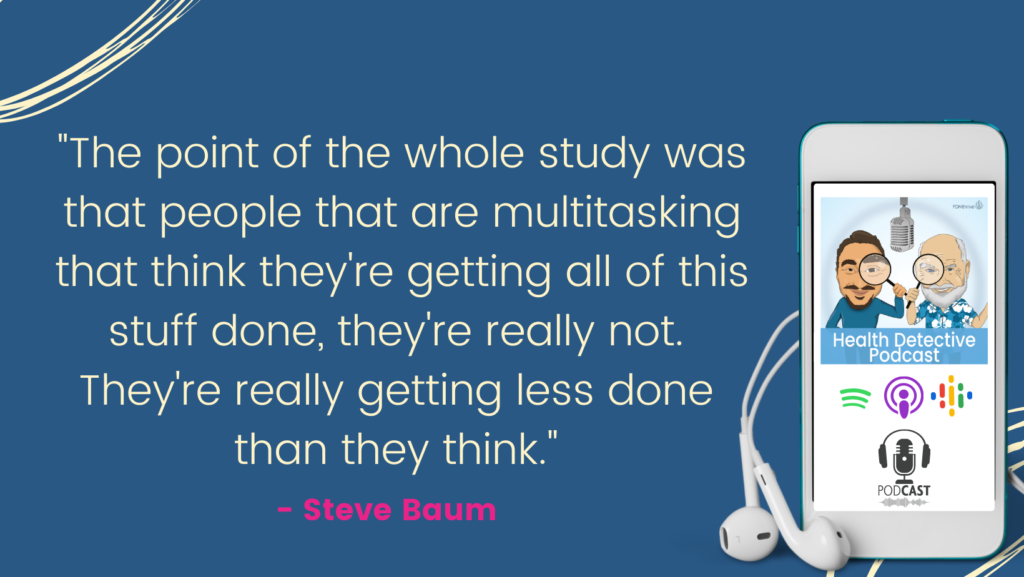
[00:32:34] Steve Baum: They actually scored higher. The point of the whole study was that people that are multitasking that think they’re getting all of this stuff done, they’re really not. They’re really getting less done than they think. But since they’re working so hard, they think they got a whole bunch of things done. That’s not just business people, it’s not just in the gym. It’s everybody. Think about the busy mom, who’s trying to juggle the kids, breakfast, school, her job, her whatever, her work.
Moms are really good multitaskers. They’re in all these different things at once, but they end up being burned out. What I always tell them is slow down a little bit. Let’s focus on your sleep, getting more of it. Let’s not work so much all at one time. Let’s focus on these little chunks.

I try to teach people to work in blocks of 50 minutes, 45 to 50 minutes, max, and then do something totally different. Maybe listen to some music or whatever. Go do some breathing exercises, meditation, and then come back to it and you’ll get more work done in less time than if you’re multitasking.
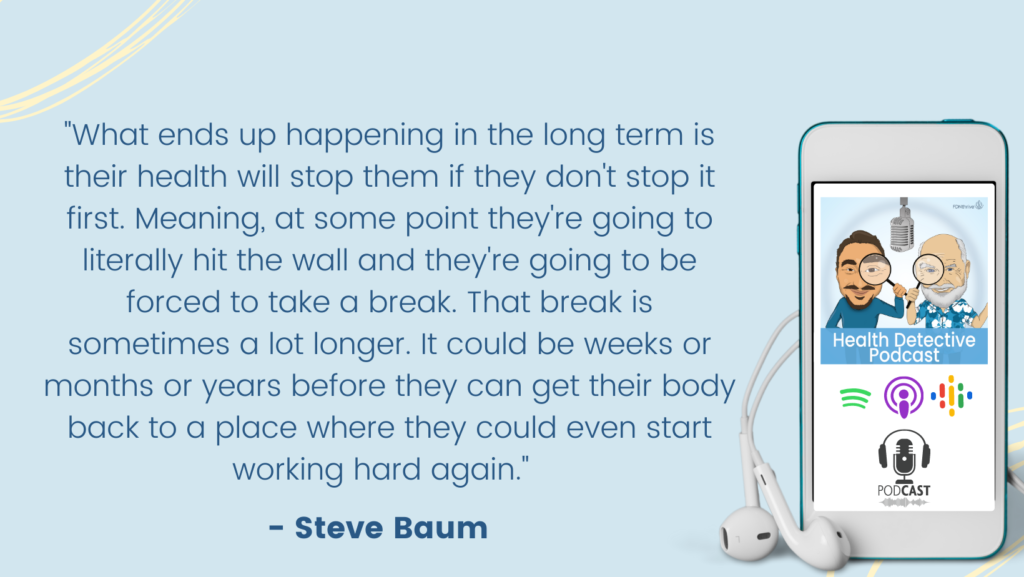
And it’s really hard to convince people of that because their number one reason for doing it is they don’t have enough time. I just find it very interesting that that seems to be what the driver is for most folks is they don’t have enough time and they’ve got all this stuff to do, and they’ve just got to push through, push through, push through. But what ends up happening in the long term is their health will stop them if they don’t stop it first. Meaning, at some point they’re going to literally hit the wall and they’re going to be forced to take a break. That break is sometimes a lot longer. It could be weeks or months or years before they can get their body back to a place where they could even start working hard again, if that makes sense.
[00:34:38] Evan: It absolutely does, Steve. I mean, I watched that with my mom. I didn’t know what I was watching necessarily as a kid, but she worked her butt off man, and she grew up in a rough environment. She’s been on the podcast herself, actually. We had her come on and share her story one time. This was a woman, at one point, who was working night shift in high school with her mom, just to help afford the bills.
And we know how bad night shift is for anyone, let alone a developing body. She learned to just out work any problem in her life. She started out as a waitress. She’d do that, six, seven days a week. Then she was doing waitressing while also opening this restaurant. I remember as a kid, I mean, I respected the hell out of the grind and the entrepreneurial aspect of this, but there’s a limit on this stuff.
You can’t do this for very long at all. What they were doing, my dad and her and my aunt, I’d watch these people go to work. They have kids to take care of, and then they’d go there until like two or three in the morning. Then they wake up at 6:00 AM and do the same thing until this restaurant was open.
This lasted for a while. Then when the restaurant started, of course that’s a new business. That’s very tough. I’ve watched her get graves’ disease and eventually have her thyroid removed, unfortunately, before I knew about this stuff. Not only does it make sense. I know it all too well.

I literally watched it and we just didn’t even understand what was happening because no one ever contributed her health issues, amazingly, to the fact that this woman was sleeping three, four hours a day and working like a mad person while also taking care of kids. I mean, do you think maybe that could cause some issues? I don’t feel like that’s rocket science to figure out.
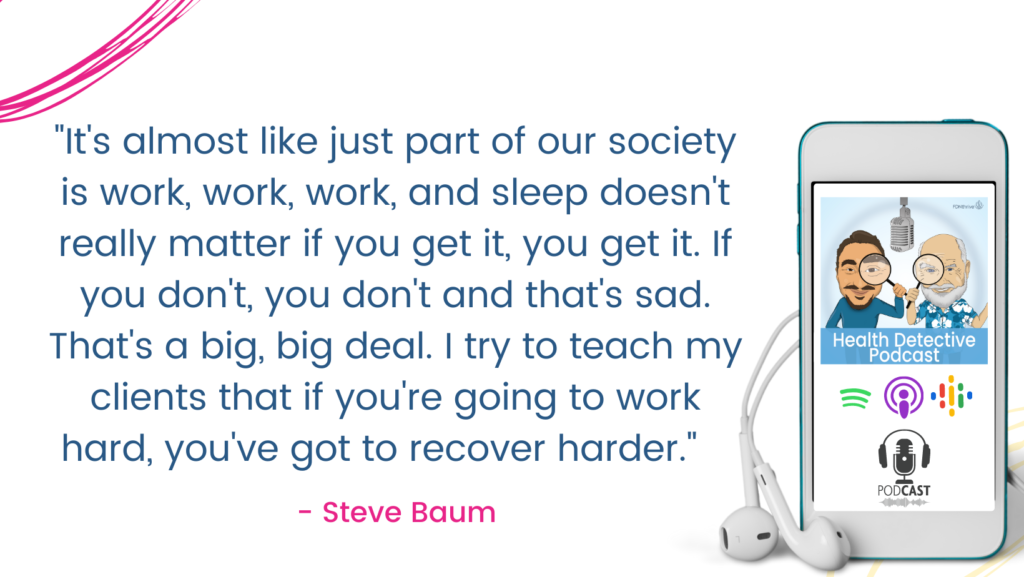
[00:36:10] Steve Baum: Yeah, it’s unfortunately I see a lot of folks that are in that same boat. I did it to myself and my wife has done it to herself. It’s almost like just part of our society is work, work, work, and sleep doesn’t really matter if you get it, you get it. If you don’t, you don’t and that’s sad. That’s a big, big deal. I try to teach my clients that if you’re going to work hard, you’ve got to recover harder.
[00:36:41] Evan: At this point. I want to make sure we’re transitioning properly and I wasn’t even sure if we were going to talk about this today, but I saw that you included it in your bio.
So, to the degree that you want to, and you find it useful, we will talk about it. I know that there was such an impact this had on your health that I think it’s actually going to be really powerful for the audience to hear that you had these health challenges as a kid, were able to overcome those, overcame the stuff with these stimulants and all those things.
Then once again, had a pretty serious thing occur. Again, to the degree that you’re able and willing and wanting, what was the thing that happened around that 2010 time? The thing that we included in your bio where things just kind of took a turn. Because I knew life was actually going pretty solidly before this major hurdle.
Tragedy Hits

[00:37:35] Steve Baum: Life was in 2000 prior to 2010 was fantastic, man. I had the dream business going. I’d built it up to the point where it was very successful. Had my dream home, had a big horse farm, a hundred acres of just like Disneyland. It was amazing. Had a great life, a great marriage, awesome little boy who was six years old. I couldn’t have asked for anything else. And then in the blink of an eye, my little boy died. Literally, just one day we’re having fun. I can remember the night before this happened, he had his friends over and they were all playing in the house and dressing up in costumes and stuff like that. Just being silly little kids.
That was the last time I saw him. I went to bed and the next day I got up and went to work really early every day. He went to a little buddy’s house for his friend’s birthday, and he and his best friend and his best friend’s mother all fell through ice and drown. That was a day that, I mean, I can’t even describe what that was like.
We went to their home because we didn’t know what happened to them. Nobody knew where they were or what happened. They were supposed to be at a movie theater. We couldn’t get ahold of the mother. Went to her house and they also had a horse farm. We were banging on the door and trying to figure out, because their car was in the garage, we were trying to figure out what the heck was going on. Called the police. The police come out and six or seven hours later they found them in the lake right near the horse barn. That was a thing that happened, that in an instant, my life went from being fantastic to, oh my God, what am I going to do? How am I going to get through this?
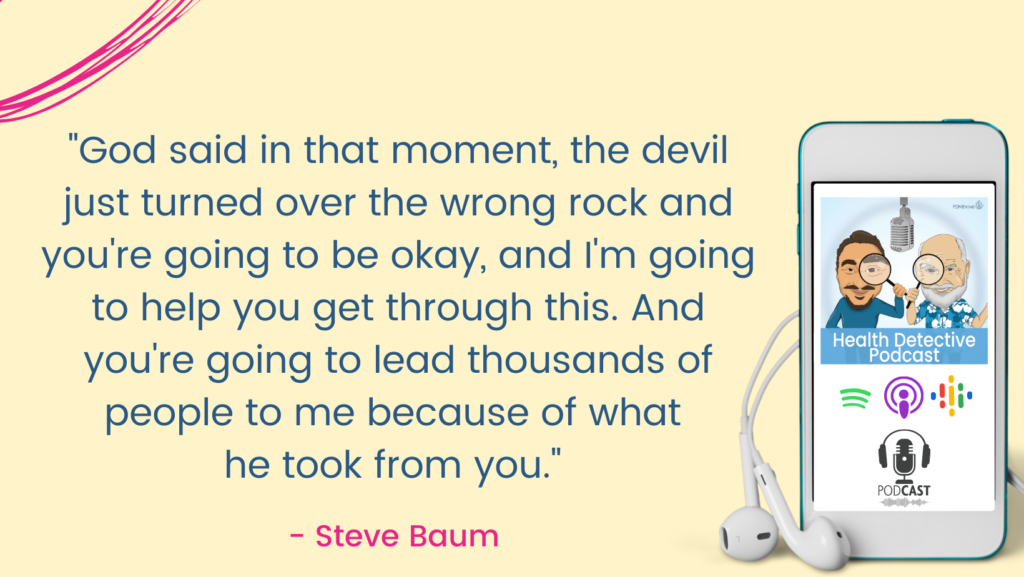
It was by the grace of God. You know, I believe in God, I pray every single day. God said in that moment, the devil just turned over the wrong rock and you’re going to be okay, and I’m going to help you get through this. And you’re going to lead thousands of people to me because of what he took from you. It’s hard to describe in that moment, that feeling, because I actually had to walk to the ambulance and get in the ambulance and identify my little boy and being in that ambulance was being in hell. I mean, that’s the only way I can describe it.
It was, it was in hell. I just remember holding him and just saying, Austin, you’ve got to wake up, man. You gotta wake up and he wouldn’t and I just held him and held him and held him. Finally, they said, you’ve got to go, you’ve got to get out of the ambulance. I remember stepping out of that ambulance and just thinking, holy shit, what am I going to do?
So, it was through a lot of prayer that God just said, look, I want you to tell your story and I want you to help other people who are going through these unbelievable tragedies persevere. I went back home and I remember just thinking to myself, I can’t go back and face all of my clients because I also had a personal training studio and I was doing all of this holistic healthcare stuff.

I just remember going, I can’t go back there. I can’t go back there and face everybody, and just keep going like putting on a show. So, I took about a week off and God said, get back in there, get back in the game because you’re not going to be sidelined. If you’re on the sidelines, you can’t help.
I remember going in, I drove into the gym and I got to the back door of my gym, and I sat outside that door and I cried for 15 minutes. I’m like, I cannot go in there. I can’t do it. God said, get inside there and put on a show, you’re going to do this. So, I did and every single day I would go in, I’d pray about it.
I would go in and deliver this show to people. They were like, oh my God, how are you getting through this? How are you able to turn this on? And I said, look, this isn’t me. This is God working through me. Anyway, long story short I knew that I couldn’t be the guy anymore.
I had to figure out a way to kind of just back out and grieve and recover. So, I bought into a franchise and plugged a bunch of people in and ran the gym and built that thing up. I kind of put the holistic health care stuff on the side for a little while, until I finally was so exhausted.
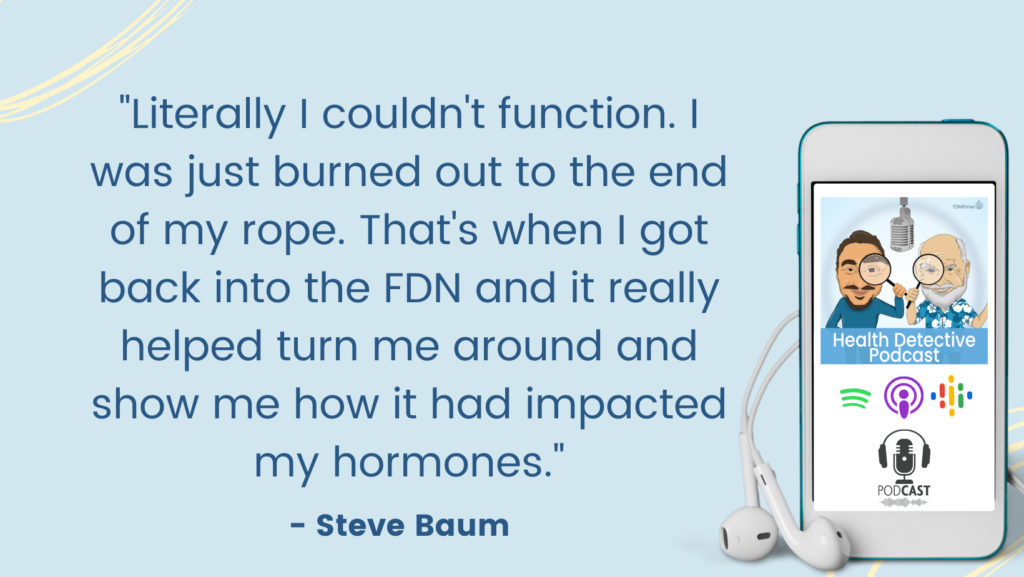
Literally I couldn’t function. I was just burned out to the end of my rope. That’s when I got back into the FDN and it really helped turn me around and show me how it had impacted my hormones. Basically, every marker you could measure was in the dumper. I used that to turn my health around, and I knew at that point that it wasn’t as easy as just putting people on a nutrition program and saying here, exercise and eat right. Let’s really dig into what’s going on under the surface and help dial all of those things in so that people could truly become healthy again. I think in a way it was an eye-opener, it was really a game-changer in terms of what’s really healthy and what’s not.
And what are the things that we can do to help people improve their health, versus what are the things that we think are going to improve their health. It don’t really change much. Doesn’t really move the needle a whole lot. I mean, I went through that, lost my marriage, lost my farm, lost a lot of stuff. But in the long run I look back on it and it really gave me a new life and it allowed me to see things in a different way. The success isn’t the driver. The driver is really helping other people unlock the keys to the dungeon that they’re in, cause everybody has their own hell.

The business side of it, don’t get me wrong, I love running successful businesses, but that’s not my driver anymore. The success isn’t the driver. The driver is really helping other people unlock the keys to the dungeon that they’re in, cause everybody, has their own hell.
People talk to me, they’re like, Oh my God, that’s terrible. I said, yeah but my deal is no more terrible than the other person who’s also living in hell. But their hell’s different. Maybe it’s depression. That’s still their hell. It’s just as big of a hell as mine was. It’s just a different label. Some people are bullied and they’re living in hell. Everybody has their own story and their own hell they’re living in. My goal is to show them how to get out of that place. If it’s through health, great, let’s figure that out. But the story is, in my case, what I try to teach people it’s, don’t give up, don’t give up, never give up.
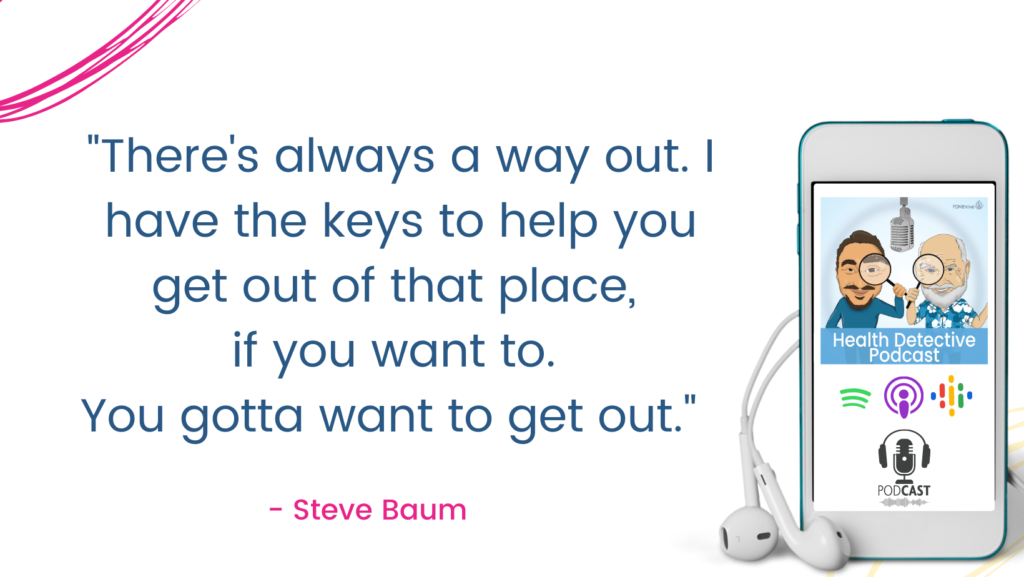
There’s always a way out. I have the keys to help you get out of that place, if you want to. You gotta want to get out. So, I wouldn’t change it because it’s made me who I am today and it’s allowed me to help a lot of people that were probably stuck in a pretty dark place.
[00:45:20] Evan: Wow! Steve, I’m so glad we got connected, man. I said this on the phone the other day, first, I can’t even pretend to be able to comprehend what that situation is like. I know you said you couldn’t describe it. It wouldn’t even matter. There’s no way any of us can comprehend that, I don’t think. But what was so interesting about us talking on the phone for the first time was the conceptual similarities in these major stressors of our lives.

And how for some odd reason that led to this feeling that we were being pulled in a different direction. That’s a heck of a thing to say, “I wouldn’t change this.” Now you and I defined that differently on the phone. Just so everyone’s clear, that’s not to say that we’d wish for something like that to happen, but not changing it is because someone like you has been able to see so clearly now, oh, wait a second, I can do something with this. I can help thousands, tens of thousands of people with this situation that happened. I love that you kind of already answered my next question because I was gonna ask like, what the heck is the message to people going through that hell right now?
And I know that you said, “Don’t give up,” but is there anything, because I say stuff similar too just to be clear. I just didn’t know if you had something. Is there anything more tangible for people that are within that hell right now? Because I agree with what you said that everyone’s hell can kind of feel actually very similar.
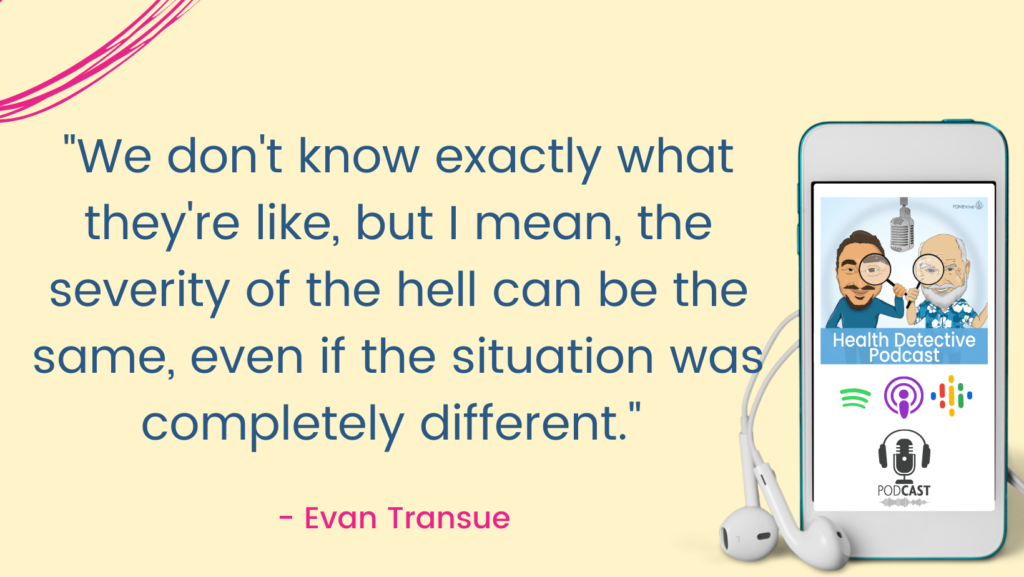
We don’t know exactly what they’re like, but I mean, the severity of the hell can be the same, even if the situation was completely different. But nonetheless, I do think it is worth acknowledging that it’d be pretty hard for most people to listen to this podcast, I would imagine, I would hope, and not be able to think, wow, that’s probably objectively worse than some of the things that I went through. If you can do this, that’s so inspiring and empowering for others to be able to do it. Is there anything tangible for people even just outside of the not giving up thing? I think that’s a powerful message, but I’m just curious if anything else comes to your mind.
Gratitude Heals
[00:47:25] Steve Baum: I can remember when I was at the bottom of the pit and I literally would get in the shower in the morning and I actually laid down in my shower, curled up in a fetal position, just crying, like I can’t, I can’t get up today. I can’t do it. I can’t do it. That was probably the lowest point where I literally thought I’m going to die.

Like, I can’t, I cannot get up. I can’t do this anymore. I’m going to shoot myself. I just remember in that moment going, all right, what can I be thankful for right now in this moment? What am I thankful for? I just started thanking God, I have hot water because a lot of people don’t and that was it.
It was just, thank God I have hot water right now in the shower. That was enough to just kind of get me out of that really dark, dark place for just a second. And I realized that, okay, the more things that I could find to be thankful for versus focusing on what happened, the farther and farther and farther I was able to dig myself out of that pit. I’m thankful for hot water. Hey, I’m thankful that I woke up today, just simple, basic things and they started to build and they got bigger and they got bigger. Gratitude and being thankful for what I did have got me out of the pit.
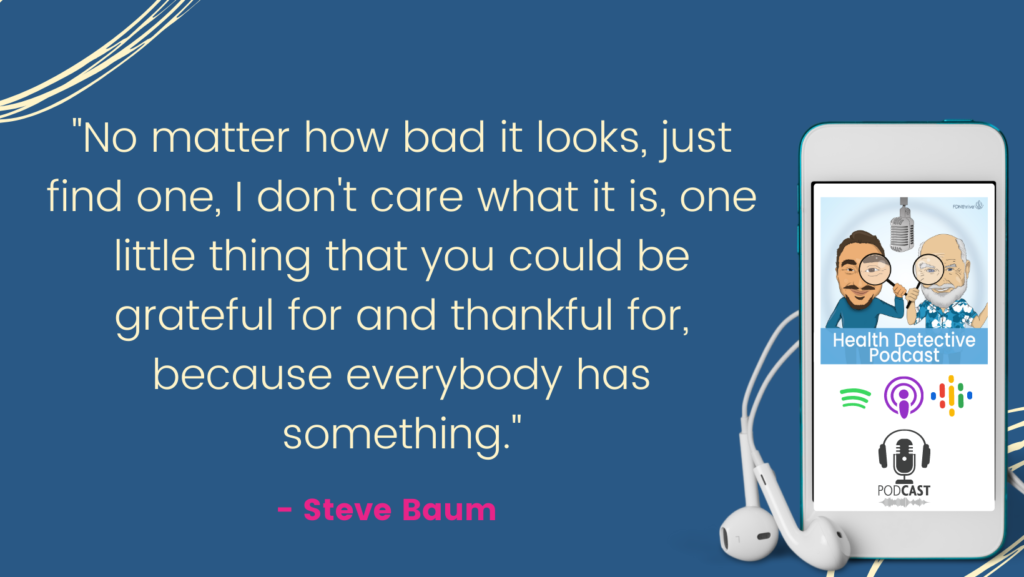
That’s what I would tell other people, no matter how bad it looks, just find one, I don’t care what it is, one little thing that you could be grateful for and thankful for, because everybody has something. If you’re taking a breath, be thankful you can take that breath. Then that’s gonna turn into, what else can you be thankful for?
Then eventually you’re going to realize that you’ve got a lot of things to be thankful for. Probably more than other people that are in a dark place and teach them to be thankful and grateful for what they have. Just keep focusing on that and it’ll turn things around.
[00:49:37] Evan: Well, listen, man, I hope you get around to that book one day, because I’m someone who’s huge into self-help personal development, those types of things, and it saved my life. It saved my life. Unfortunately, there is a fraction of the population that listens to those types of things or hears practices like the one that you just said and think all that can’t work. That’s not that important. How the hell is someone going to listen to a podcast like this, and you’re about to tell me that that’s not powerful, that doesn’t work.
I think if it’s good enough for Steve, it’s probably good enough for the rest of us. I think so many of us don’t even give it an honest try. Some of these practices, we just dismiss it before we ever even gave it a shot. At best, maybe we do it for one day. Oh, well, that didn’t change my whole life so I’m just going to give up on that. It’s like guys, these are practices. These are things that need to be done overall. It’s such a weird world that we live in.

I always find it so crazy that we can experience so much pain here, physically, mentally, emotionally, yet there can be such beauty and joy. Then there’s people who learn to kind of master the mind and take even the darkest of things and turn it into something absolutely amazing. I haven’t figured out exactly why some are able to do that yet and why others can never get there. I think it is a lot around practices. But again, I hope that you get to that book one day and then we’d love to have you back on, because I would read that in a heartbeat, my friend.
[00:51:01] Steve Baum: Yeah, I want to say this that if you met me and you were around me enough, you would realize that I’m not a woo woo guy, if that makes sense. So, for me to sit here and say, practice gratitude every day, it’s kind of funny because if you would’ve said that to me before all of this happened in my life, I would have laughed at you. Because that’s just not something that I would have even considered doing. I mean, not that I wasn’t thankful for everything, but to practice it to me would have been like, go home. Go stare at a candle at home or do something like that, which I tried, trust me. When I was going through this, I tried everything and it works. I can’t explain how or why it works. It just does.
[00:51:54] Evan: Steve, we got the last several minutes in the show here and I want to make sure, one, people know where they can find you. Just so there’s context, guys, Steve had been in business for himself for a while. Did a lot of stuff. Owned gyms and stuff, and then has reentered that world of FDN over the last year or two. If that’s, right?
Doing FDN 100%
[00:52:16] Steve Baum: Literally in the last year, I sold my gym a little over a year ago, and it was kinda just sitting around going, gosh, what am I going to do with my life?
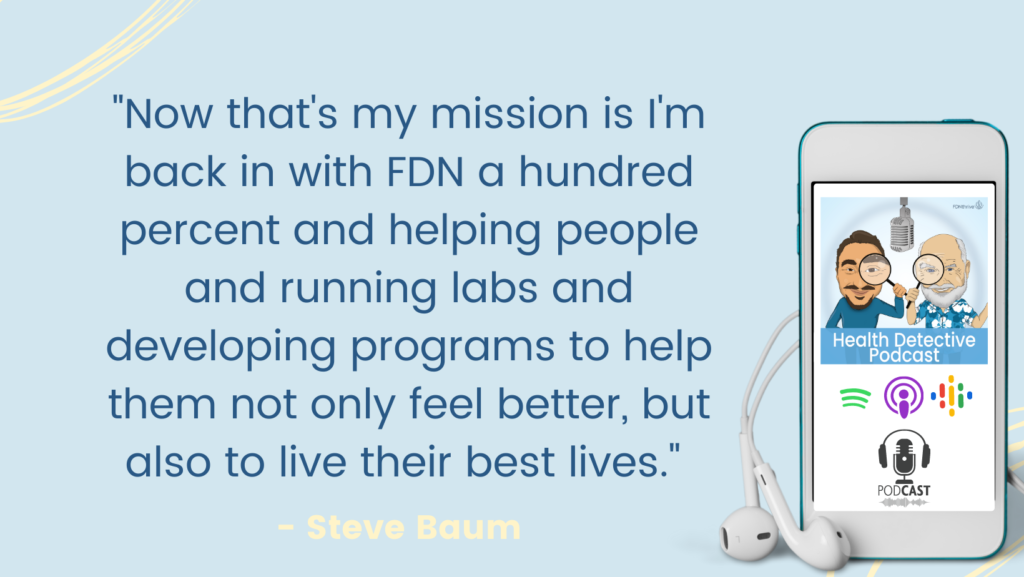
What do I want to do? What am I passionate about? And I got back into FDN and I went through the level two and just really, really am passionate and obsessed with learning as much as I possibly can to help other people. Now that’s my mission is I’m back in with FDN a hundred percent and helping people and running labs and developing programs to help them not only feel better, but also to live their best lives.
That’s the name of the game, right? The point of view, if you feel great and you’re not living a great life, it doesn’t really matter. It’s really helping them focus on how can we make them better. How can we give them more energy and restore their health to optimal levels so that they can feel great and live a great, happy life and impact other people around them in a positive way?
[00:53:19] Evan: Awesome man!

Well, and for those that don’t know the context or the background of that, Level I FDN, that’s what we do here all the time. I mean, that’s a solid foundation for anyone. If you’re starting pursuing these higher things in FDN, that’s pretty advanced stuff and it gets very technical and there’s a lot extra to offer there to someone for maybe that’s highly complicated with their health issues.
Where to Find Steve
I mean, you’ve got someone here obviously with an incredible story, highly credentialed, and I don’t think it matters that you’re just quote, unquote, getting back into it. You’re more qualified than a lot of the people we have on. Steve, where can people find you if they want to work with you?
[00:53:55] Steve Baum: The best way to reach me is to email me or text me, either one of those ways.
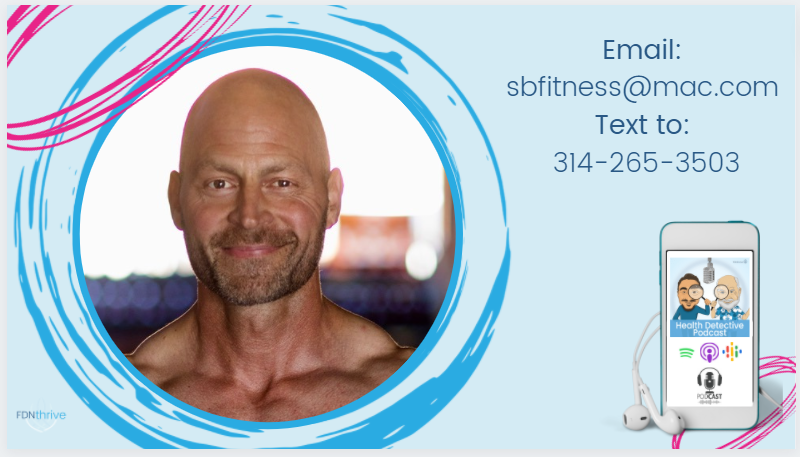
My email address is S-B, so as Steve Baum, sbfitness, F- I- T- N- E- [email protected]. ([email protected]) Or you can also text me at 3 1 4 2 6 5 3 5 0 3. Either of those work.
[00:54:22] Evan: Awesome. I just jotted those down to put it in the show notes. I think you’re the first person that came on and offered a text and that’s a direct number by the way.
Cause that’s the number I was texting Steve off of. So, you guys got his number. I mean, that’s pretty cool to come on here and offer that. Just to be really clear because I don’t know if you define this or have a specific niche, obviously you gave us a general overview, for the audience, is there a specific type of person that you look for? Like what is the ideal client that could walk through your door where you’re like, dang, I know I can help this person at the highest level.
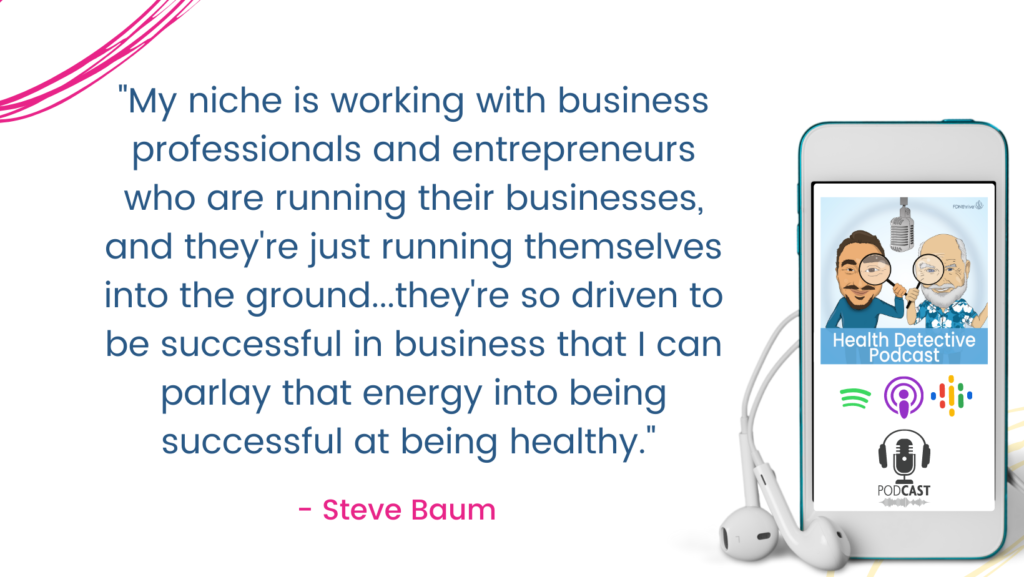
[00:54:51] Steve Baum: Yeah, my niche is working with business professionals and entrepreneurs who are running their businesses, and they’re just running themselves into the ground. They’re stressed out, their energy’s in the tank and they just think, well, I got to keep working harder and harder and harder.
Those are the folks I really love to help because they’re so driven to be successful in business that I can parlay that energy into being successful at being healthy.
[00:55:20] Evan: Makes sense to me. Yeah, I’m actually glad that you said that because I don’t think that niche was actually inferred from the things that I got.
So that’s who Steve can best serve. That doesn’t mean any FDN can’t serve a variety of people, but obviously, that’s your number one. I always like to ask that. Steve, I want to finish up with our signature question on the Health Detective Podcast. It’s a simple one that has actually a lot of complexities, right?

Because especially someone that has as much knowledge as you, sometimes it can be hard to answer this question. The question is, if I gave Steve a magic wand and you could get everyone in this world to do one thing for their health, whether that was literally do one thing or maybe stop doing one thing, what is the one thing you’d get everyone to do?
[00:56:06] Steve Baum: Sleep eight hours a night, solid, like solid restful sleep eight hours a night.
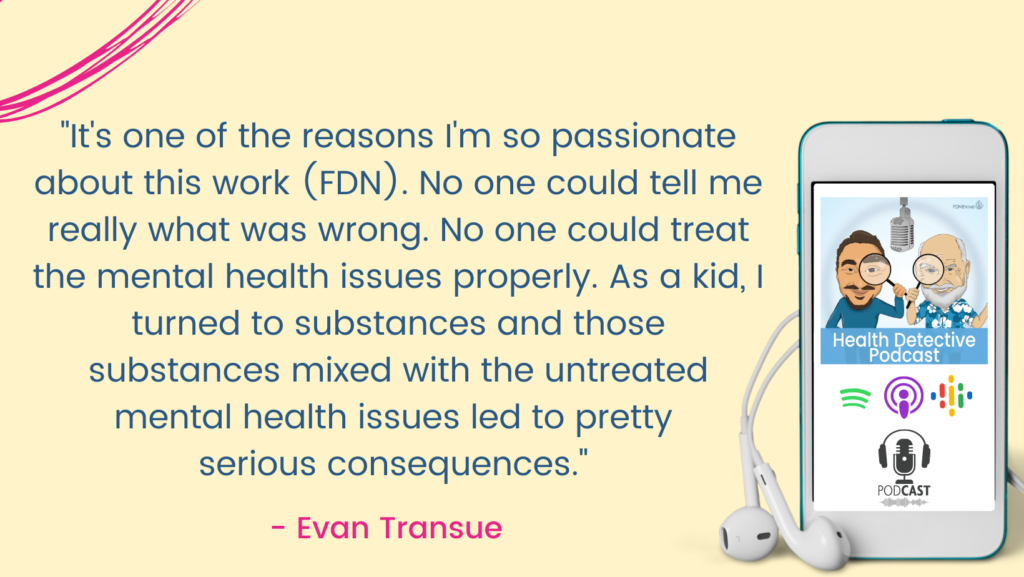
[00:56:20] Evan: Number one. I have a level of respect for people like Steve that’s kind of hard to really put into words. I mean that. Because it’s people like him that saved my life and brought me out of my depths when I needed it the most. If you haven’t ever heard this episode on the show, I’m someone, who, my mental health got pretty bad. It was unresolved. It’s one of the reasons I’m so passionate about this work. No one could tell me really what was wrong. No one could treat the mental health issues properly. As a kid, I turned to substances and those substances mixed with the untreated mental health issues led to pretty serious consequences.
I did not graduate high school. I was arrested at one point and I did spend my 18th birthday on house arrest. One of the first things I got exposed to after this very serious time in my life was motivational content, both through books and motivational speakers. I would hear these people like Steve, who had been through the most insane, unfair, unjustified adversities.
And they somehow got to the point in their life where they could go live at least a normal as possible life where they’re helping others. It’s not a comparison game. It’s never about that. I love how Steve, with all the stuff that he’s been through, says in this episode, he made it very clear that it’s not a competition.
He made it very clear that everyone could kind of experience the same level of pain, even though his situation might be different, but let’s call it what it is. I think there are certain things that are just worse in life. What Steve talked about today is not the same as losing your pet hamster, right?

Let’s just be straight up about it. When I heard about the things that people like Steve went through, I compared it to my life and I knew I had been through some serious stuff, but I would just start saying, I changed the narrative in my mind. The narrative that had been there for years, I’m like, wow, if they can do this, maybe I can figure this stuff out.
It’s funny because I’m a huge science nerd. I’m someone who loves all this technical stuff. I like math or whatever. People always ask, why did you choose the motivational speaker route? I had to choose it because these people saved my life. So, Steve, man, I just, again, I thank you so much for coming on and sharing the story with people, because this is one of those things that sticks with individuals for a long time.
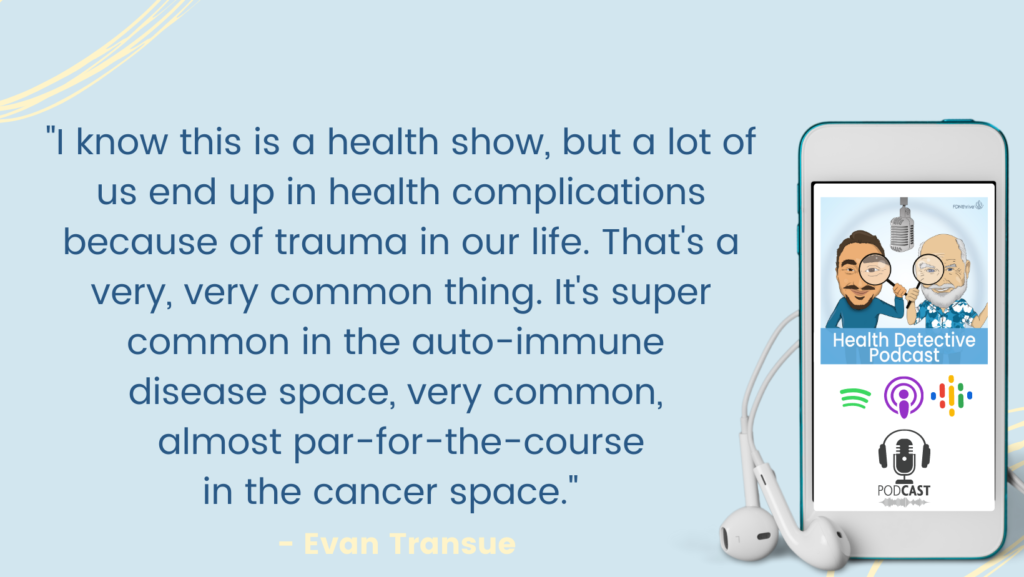
I can think of the stories that I heard back at 18 years old when I needed it the most. I know this is a health show, but a lot of us end up in health complications because of trauma in our life. That’s a very, very common thing. It’s super common in the auto-immune disease space, very common, almost par for the course in the cancer space.
For individuals to get to hear something like this and know that you were already doing the health thing beforehand, you are already doing it. This happens and you figure this out and you pull back out and you use it to help others because that’s the only thing that could possibly make sense of this. That’s a one-in-a-million type of individual. I’m blessed to know you, man. So great to have you on.
Conclusion
If you guys liked what this guy was sharing, I really hope that you’ll leave a great review for him. Unfortunately, we don’t have an Instagram for Steve at this time. He’s kind of rolling old school like that, but you guys got his email.
Let me pull it up here again, just so I’m making sure that I shouted out directly for you guys. It is [email protected]. That’s [email protected]. I talked to him privately about this, but I’ll tell you guys as well. This is someone that even though I don’t really deal with any health complications at this point overall, I feel like I want to work with this guy.
I just want the mindset of being able to take something like this and turn it into good. I think that’s amazing. I want to be around people like that. If you guys want to be around someone like that, you guys know where to find him, [email protected]. Steve, thank you one more time, my friend. We again, appreciate you coming on.
And if you guys liked the information that we are sharing on this show, and you’d be so kind as to leave a five-star review on apple podcasts, we would love ya even more than we already do. I’m looking forward to talking to you guys again soon, but until then, take care.


